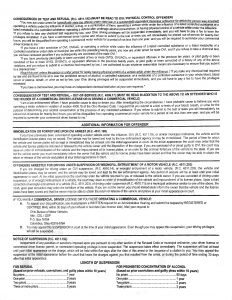 The United States Supreme Court recently heard oral arguments in the case of Mitchell v. Wisconsin. As this blog discussed previously, this the third case in a series of cases dealing with whether the police can take a DUI/OVI suspect’s blood without a search warrant. The questions and statements from the bench during the oral argument may telegraph how each justice views the issue. However, in our experience, it is difficult to predict the outcome of a case based on the oral arguments.
The United States Supreme Court recently heard oral arguments in the case of Mitchell v. Wisconsin. As this blog discussed previously, this the third case in a series of cases dealing with whether the police can take a DUI/OVI suspect’s blood without a search warrant. The questions and statements from the bench during the oral argument may telegraph how each justice views the issue. However, in our experience, it is difficult to predict the outcome of a case based on the oral arguments.
Articles Posted in DUI/OVI laws and cases
Officer Obtains Urine Test Result From Nurse: DUI Dismissed
 Brynn Campbell was involved in a head on-crash which killed the 83-year-old woman driving the other car. Campbell was taken to the hospital, and hospital staff performed a urine test. Although Campbell showed no obvious signs of impairment, a police officer went to the hospital and asked the nurse for the urine test results. The results showed Campbell’s alcohol level was well over the limit, according to the Global News. The officer then obtained a search warrant to obtain Campbell’s urine samples and have them tested. Campbell was charged with vehicular homicide. She was acquitted by the trial court, and the prosecution appealed.
Brynn Campbell was involved in a head on-crash which killed the 83-year-old woman driving the other car. Campbell was taken to the hospital, and hospital staff performed a urine test. Although Campbell showed no obvious signs of impairment, a police officer went to the hospital and asked the nurse for the urine test results. The results showed Campbell’s alcohol level was well over the limit, according to the Global News. The officer then obtained a search warrant to obtain Campbell’s urine samples and have them tested. Campbell was charged with vehicular homicide. She was acquitted by the trial court, and the prosecution appealed.
Does Court’s Ruling Signal A Change In Thinking About Implied Consent Laws?
 Anyone who has been charged with an OVI / DUI in Ohio has had the pleasure of listening to an officer read several paragraphs from the back of a form provided by the Ohio BMV. This often droll recitation is required by Ohio’s implied consent law, which says that anyone who operates a vehicle in the state implicitly consents to takes a blood/breath/urine test for drugs and/or alcohol if arrested for OVI. An implied consent law similar to Ohio’s was recently found to be unconstitutional by the Georgia Supreme Court.
Anyone who has been charged with an OVI / DUI in Ohio has had the pleasure of listening to an officer read several paragraphs from the back of a form provided by the Ohio BMV. This often droll recitation is required by Ohio’s implied consent law, which says that anyone who operates a vehicle in the state implicitly consents to takes a blood/breath/urine test for drugs and/or alcohol if arrested for OVI. An implied consent law similar to Ohio’s was recently found to be unconstitutional by the Georgia Supreme Court.
Court Disbelieves Officer And Concludes Arrest Was Unlawful In Ohio DUI/OVI Case
 The credibility of a law enforcement officer makes a difference in court. Judges seem to presume officers are credible. Officers, however, can ruin their credibility with unprofessional conduct, uncorroborated claims, and unconfirmed clues. The trooper in a recent Franklin County case did just that, and it resulted in the court of appeals concluding the trooper’s arrest of the defendant was unlawful.
The credibility of a law enforcement officer makes a difference in court. Judges seem to presume officers are credible. Officers, however, can ruin their credibility with unprofessional conduct, uncorroborated claims, and unconfirmed clues. The trooper in a recent Franklin County case did just that, and it resulted in the court of appeals concluding the trooper’s arrest of the defendant was unlawful.
Preview: Third Episode In Trilogy Addressing Blood Tests And Search Warrants
 Just as Hollywood has produced some good movies in trilogies, the United States Supreme Court has produced some good case law in trilogies. The Court addressed the right to confront crime lab analysts with the trinity of Bullcoming, Melendez-Diaz and Williams. On the issue of the need for a warrant to draw blood from a DUI suspect, two-thirds of the triad have been completed: McNeely and Birchfield. The triumvirate is about to be consummated with Mitchell v. Wisconsin.
Just as Hollywood has produced some good movies in trilogies, the United States Supreme Court has produced some good case law in trilogies. The Court addressed the right to confront crime lab analysts with the trinity of Bullcoming, Melendez-Diaz and Williams. On the issue of the need for a warrant to draw blood from a DUI suspect, two-thirds of the triad have been completed: McNeely and Birchfield. The triumvirate is about to be consummated with Mitchell v. Wisconsin.
New Ohio Law Is Focused On Distracted Driving
 In this space, we typically discuss issues related to OVI/DUI law. Today, however, we’re going to take a brief detour and discuss a growing issue: distracted driving. With the near ubiquity of cell phones, instances of fatal car accidents caused by distracted drivers have approached 3,500 nationally in recent years. This year, the State of Ohio passed a new law in an effort to combat this problem.
In this space, we typically discuss issues related to OVI/DUI law. Today, however, we’re going to take a brief detour and discuss a growing issue: distracted driving. With the near ubiquity of cell phones, instances of fatal car accidents caused by distracted drivers have approached 3,500 nationally in recent years. This year, the State of Ohio passed a new law in an effort to combat this problem.
When Is A Bath Robe Evidence Of DUI / OVI In Ohio?
 We all remember learning in school the Fourth Amendment is the one which requires police to get a warrant to search your house or arrest you. That bullet point is great for helping kids learn the basics of their Constitutional rights; but, in practice, Fourth Amendment law is far more complex and far less certain. The complexity and uncertainty is illustrated by two recent Ohio DUI / OVI cases in which the same court looks at two very similar cases and comes to completely opposite conclusions.
We all remember learning in school the Fourth Amendment is the one which requires police to get a warrant to search your house or arrest you. That bullet point is great for helping kids learn the basics of their Constitutional rights; but, in practice, Fourth Amendment law is far more complex and far less certain. The complexity and uncertainty is illustrated by two recent Ohio DUI / OVI cases in which the same court looks at two very similar cases and comes to completely opposite conclusions.
O Is For Operate: OVI And Physical Control In Ohio

When a trooper’s DUI charge is dismissed, it may appear the trooper is getting special treatment. In the case of N.C. trooper Dennis Tafoya, the DUI charge was dismissed because the evidence didn’t prove he committed a crime. Although he may have been very intoxicated while sitting in his car, the car was not running. In North Carolina, that is not an offense. In Ohio, the law is different.
Using Crime Lab Reports In Ohio DUI / OVI Cases
 Although Ohio courtrooms may not seem as dramatic and intriguing as those on C.S.I., crime laboratory tests are regularly a part of Ohio criminal cases. In Ohio DUI / OVI cases, and in drug-related cases, crime lab technicians use scientific tests to identify drugs. The lab techs write reports about the analyses and sometimes testify at trial about the tests. A recent case in an Ohio appellate court discusses the detailed procedure for using crime lab reports in Ohio DUI / OVI and criminal trials.
Although Ohio courtrooms may not seem as dramatic and intriguing as those on C.S.I., crime laboratory tests are regularly a part of Ohio criminal cases. In Ohio DUI / OVI cases, and in drug-related cases, crime lab technicians use scientific tests to identify drugs. The lab techs write reports about the analyses and sometimes testify at trial about the tests. A recent case in an Ohio appellate court discusses the detailed procedure for using crime lab reports in Ohio DUI / OVI and criminal trials.
What Does It Mean To “Witness” A Urine Sample In Ohio DUI / OVI Cases?

Most police officers probably do not go to work hoping to witness a suspect provide a urine sample. It’s likely not one of those things they go home and share with their family and friends. But it’s one of those things Ohio law requires in OVI cases. If a suspect is arrested and asked to provide a urine sample, an Ohio Department of Health regulation states, “The collection of the urine specimen must be witnessed”. The precise meaning of “witnessed” was the subject of a recent case in an Ohio court of appeals.
 Columbus OVI/DUI Attorney Blog
Columbus OVI/DUI Attorney Blog

